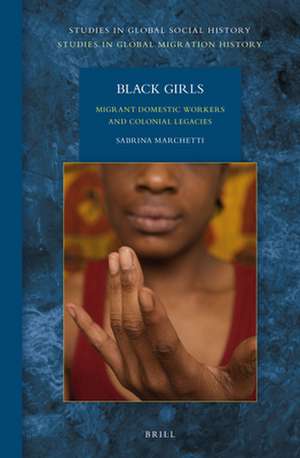Black Girls: Migrant Domestic Workers and Colonial Legacies: Studies in Global Social History / Studies in Global Migration History, cartea 16/4
Autor Sabrina Marchettien Limba Engleză Hardback – 26 iun 2014
Preț: 610.67 lei
Preț vechi: 744.72 lei
-18% Nou
Puncte Express: 916
Preț estimativ în valută:
116.87€ • 121.56$ • 96.48£
116.87€ • 121.56$ • 96.48£
Carte indisponibilă temporar
Doresc să fiu notificat când acest titlu va fi disponibil:
Se trimite...
Preluare comenzi: 021 569.72.76
Specificații
ISBN-13: 9789004276925
ISBN-10: 9004276920
Pagini: 216
Dimensiuni: 155 x 235 x 13 mm
Greutate: 0.48 kg
Editura: Brill
Colecția Brill
Seria Studies in Global Social History / Studies in Global Migration History
ISBN-10: 9004276920
Pagini: 216
Dimensiuni: 155 x 235 x 13 mm
Greutate: 0.48 kg
Editura: Brill
Colecția Brill
Seria Studies in Global Social History / Studies in Global Migration History
Cuprins
List of Figures
Acknowledgments
Introduction
1. Keywords
1. Postcoloniality
2. Black Europe
3. Memory and identity
4. Intersectionality
5. Body work
6. Home
7. Tactics
2. DIFFERENCES AND SIMILARITIES IN HISTORY
Suriname
1. Colonialism and slavery
2. The Independence
3. Moving from Suriname to the Netherlands
4. Migration and racism in the Netherlands
5. Living in Rotterdam
6. Afro-Surinamese women in the Dutch care sector
Eritrea
1. Eritrea’s history and Italian colonialism
2. Towards the Independence
3. Eritrean migration to Italy
4. Migration and racism in Italy
5. Eritreans in Rome
6. Eritrean women in the Italian domestic sector
PART I – POSTCOLONIAL MIGRANTS
3. Colonial Acculturation and Belonging
1. Black Dutch
2. The ‘ambivalence’ of bonds
3. The case of school education
4. Paramaribo and Asmara as ‘Culture-Contact Zones’
1. Separation and survival of domestic slavery
2. A hierarchical cultural contamination
3. Spatial propinquity and cultures
4. Hierarchies within ‘familiarity’
5. The case of mass and popular culture
5. Postcolonial Encounters: Arriving in Italy and the Netherlands
1. Class and belonging after the migration
2. Asymmetries of recognition
3. The legacy of slavery
PART II – MIGRANT DOMESTIC LABOUR
6. A Labour Niche for Postcolonial Migrant
1. Niche formation and coloniality of power
2. Substitution across class and ‘race’/ethnicity
3. Religious figure and employment
4. The ‘good’ job
5. Agencies and ‘ethnic’ representations
7. Narratives and Practices of Work and Identity
1. Everyday (domestic) practices and identity
2. Rhythms and gestures of care
3. Self-identification between care, cleaning and servitude
4. Time, body and enactment of power
8. ‘Ethnicisation’ of Care and Domestic Skills
1. ‘Ethnicisation’ and the right personality
2. Subservience as a skill
3. Familiarity with domestic work as a social position
4. Troubling reversals of hierarchies
5. The ambivalence of a caring personality
6. The case of food and cooking
9. Racism at Work, Under Colonial Legacies
1. Racism, ressentiment and slavery
2. Home care as a ‘scenario of racism’
3. Spatial confinement
4. Bodies: wearing inferiority
5. Re-enacting colonial times
Conclusions
Appendices
I - Notes on the fieldwork
II – Notes on the interviewees
Bibliography
Index
Acknowledgments
Introduction
1. Keywords
1. Postcoloniality
2. Black Europe
3. Memory and identity
4. Intersectionality
5. Body work
6. Home
7. Tactics
2. DIFFERENCES AND SIMILARITIES IN HISTORY
Suriname
1. Colonialism and slavery
2. The Independence
3. Moving from Suriname to the Netherlands
4. Migration and racism in the Netherlands
5. Living in Rotterdam
6. Afro-Surinamese women in the Dutch care sector
Eritrea
1. Eritrea’s history and Italian colonialism
2. Towards the Independence
3. Eritrean migration to Italy
4. Migration and racism in Italy
5. Eritreans in Rome
6. Eritrean women in the Italian domestic sector
PART I – POSTCOLONIAL MIGRANTS
3. Colonial Acculturation and Belonging
1. Black Dutch
2. The ‘ambivalence’ of bonds
3. The case of school education
4. Paramaribo and Asmara as ‘Culture-Contact Zones’
1. Separation and survival of domestic slavery
2. A hierarchical cultural contamination
3. Spatial propinquity and cultures
4. Hierarchies within ‘familiarity’
5. The case of mass and popular culture
5. Postcolonial Encounters: Arriving in Italy and the Netherlands
1. Class and belonging after the migration
2. Asymmetries of recognition
3. The legacy of slavery
PART II – MIGRANT DOMESTIC LABOUR
6. A Labour Niche for Postcolonial Migrant
1. Niche formation and coloniality of power
2. Substitution across class and ‘race’/ethnicity
3. Religious figure and employment
4. The ‘good’ job
5. Agencies and ‘ethnic’ representations
7. Narratives and Practices of Work and Identity
1. Everyday (domestic) practices and identity
2. Rhythms and gestures of care
3. Self-identification between care, cleaning and servitude
4. Time, body and enactment of power
8. ‘Ethnicisation’ of Care and Domestic Skills
1. ‘Ethnicisation’ and the right personality
2. Subservience as a skill
3. Familiarity with domestic work as a social position
4. Troubling reversals of hierarchies
5. The ambivalence of a caring personality
6. The case of food and cooking
9. Racism at Work, Under Colonial Legacies
1. Racism, ressentiment and slavery
2. Home care as a ‘scenario of racism’
3. Spatial confinement
4. Bodies: wearing inferiority
5. Re-enacting colonial times
Conclusions
Appendices
I - Notes on the fieldwork
II – Notes on the interviewees
Bibliography
Index
Notă biografică
Sabrina Marchetti, Ph.D (2010), Utrecht University, is currently Jean Monnet Fellow at the European University Institute in Florence. She works on issues of gender, migration and labour.










